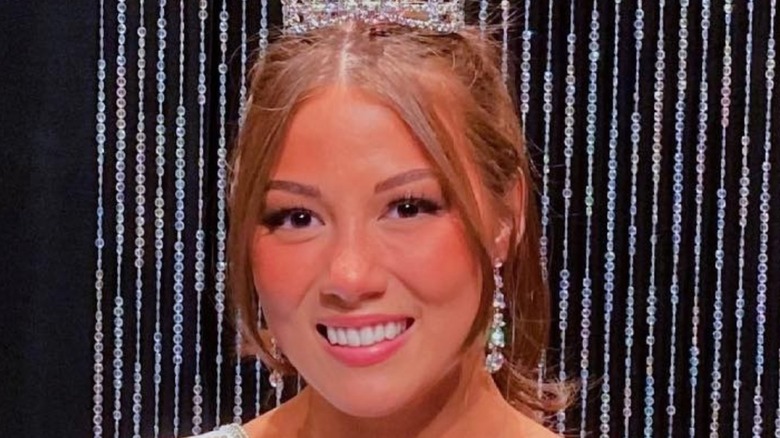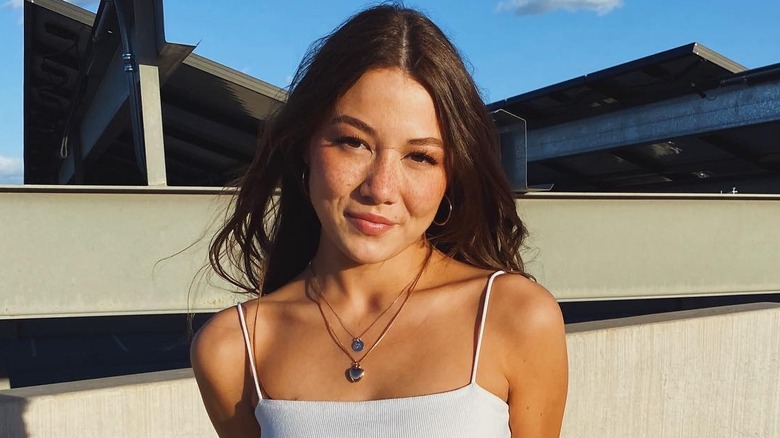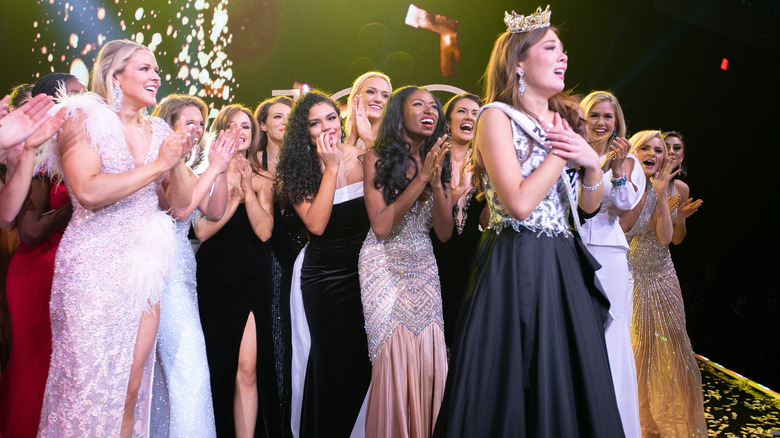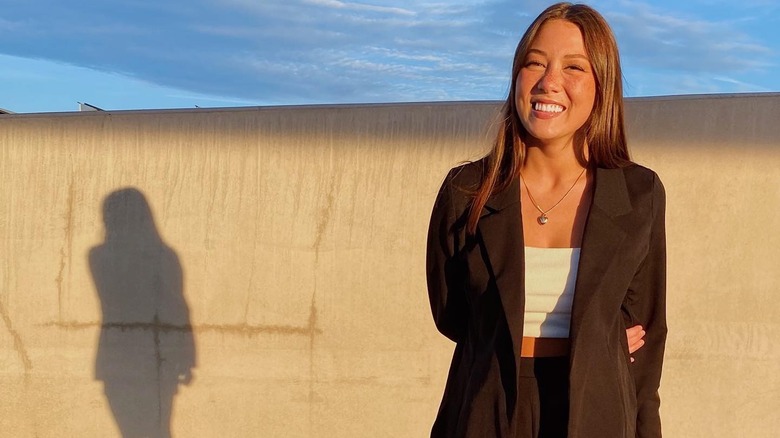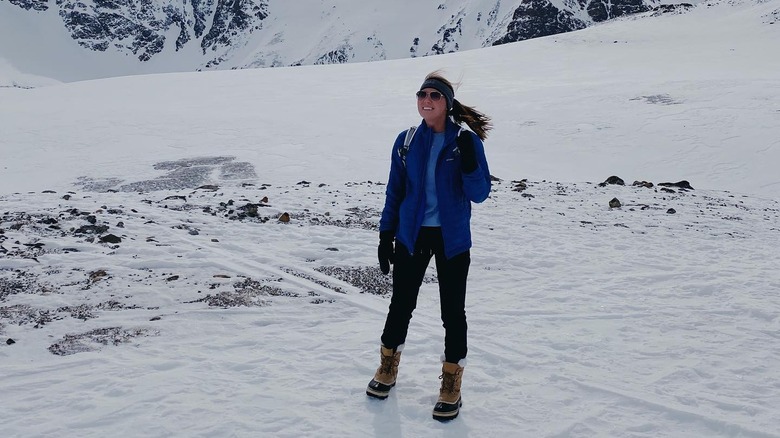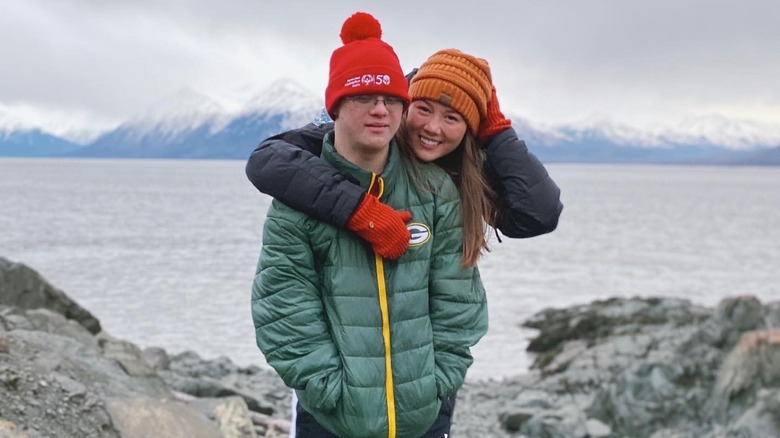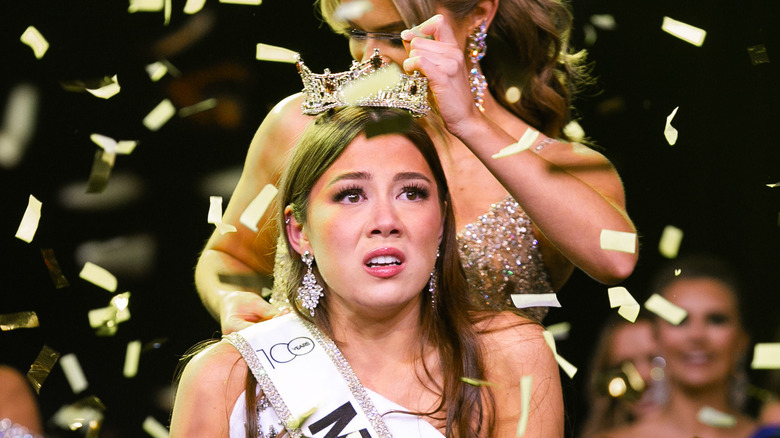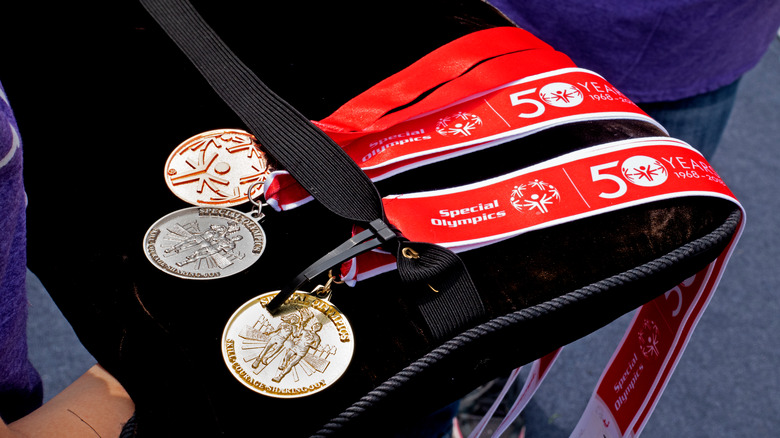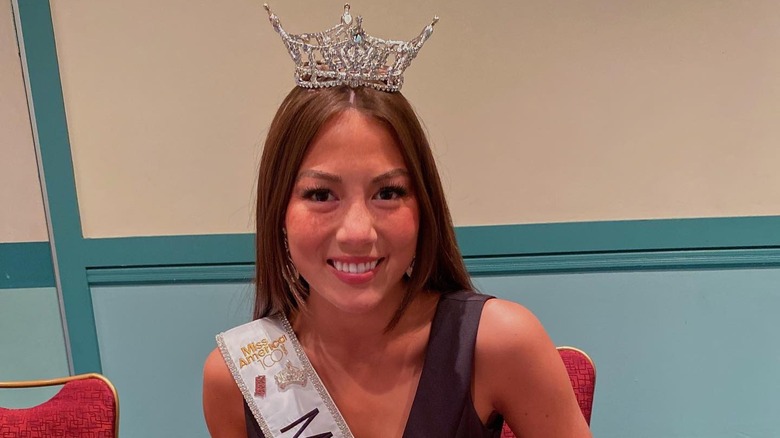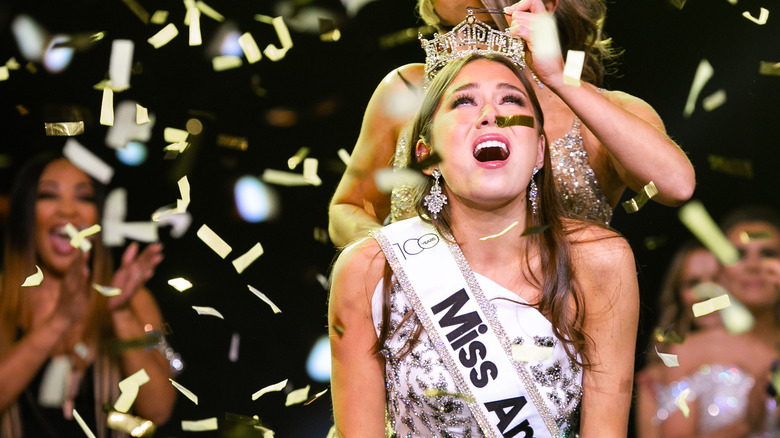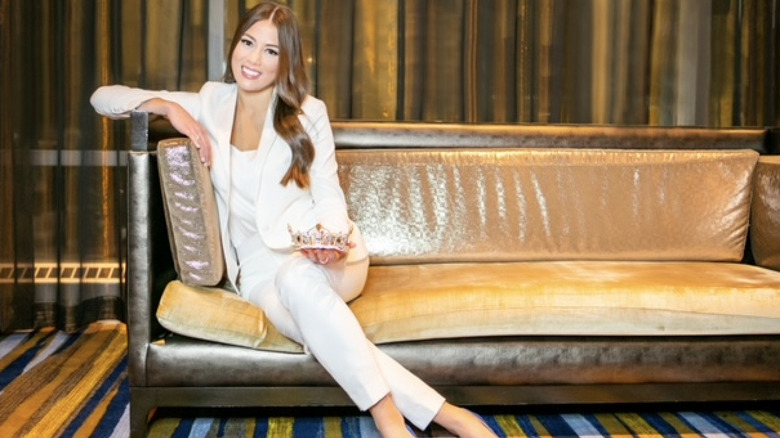Miss America Emma Broyles On Being Crowned, Mental Health, And What's Next – Exclusive Interview
Miss America's 100th winner, Emma Broyles, made history in summer 2021 when she received the crown and the coveted title. Broyles is the first Korean-American woman to take home the crown. She is also the first Alaskan woman to win the title (via NPR). Historic firsts aside, Broyles' talents, empathy, social initiative, humility, and candor are all out of this world.
Health Digest sat down with Miss America 2022 herself to further discuss some of her on-stage comments and of course, health and wellness. Broyles believes in representing herself as someone who is real — someone who has flaws and has to confront challenges. From being diagnosed with attention-deficit/hyperactivity disorder (ADHD) and dermatillomania, a skin-picking condition that is related to obsessive-compulsive disorder, to working as an advocate for people with intellectual disabilities, Broyles is truly the queen when it comes to being a role model for young girls everywhere.
In this exclusive interview, Broyles discusses her journey to accepting her neurodiversity, her trials and tribulations leading up to her big win, and the reason why the Special Olympics have such a firm grip on her heart.
How dermatillomania is shaping Emma Broyles' career ambitions
Congratulations on [your big win]! You won a bunch of scholarship money, and the word on the street is you want to use that money to go to med school to become a dermatologist. What drew you to that field?
I always knew that I wanted to go to medical school, just because I've always had a passion for medicine, but specifically dermatology. I always had pretty bad skin grow growing up. And then when I was about probably a sophomore or a junior in high school, I developed dermatillomania, which is the formal term for skin picking. And it got pretty bad — to the point where my entire face was just covered in open sores all over the place. And they were really hard to cover with makeup because it's kind of difficult to cover a scab in makeup.
It made it really hard for me to do a number of things. And I think that, especially in college, it got to the point during COVID, where I wouldn't leave my dorm for like a week at a time, because it was just, I didn't want anyone to see me up close.
I spent so much time kind of constructing this facade of this perfect girl who had no issues. And I felt like the second somebody saw that, they would know who I really am. And so, something that I did in my recovery process and the process that it took to finally overcome or get my dermatillomania under control was working with my dermatologist to first really clear my acne. And he was great. He was really patient with me, and he tried a bunch of different things.
And then now, I've had the clearest skin I've ever had in my life. It's crazy. And I can't believe that it's all just because of the power of medicine and the knowledge of my dermatologist. I got really into looking at the ways that different medications, oral medications, play in with topical medications and retinols and gels and creams and moisturizers. And I really, really fell in love with skincare.
And so, I realized that I really wanted to go into dermatology, especially since I have this background where I know that having bad skin can really affect your life. I kind of have that ability to connect with my patients on that level, but I really want to be that person for somebody else. Because I feel like once your skin clears, it's like a whole new world for you, a whole new self-confidence. That's kind of how I got into dermatology.
Getting diagnosed with ADHD at 19 was life-changing
Another thing that you've talked about publicly is being diagnosed with ADHD as an adult. I'm curious how those [conditions] fit together and what the diagnosis looked like for you?
This was something that I talked about during my onstage question, but women with ADD or ADHD tend to go undiagnosed for most of their lives, and most end up never getting diagnosed.
That was kind of the case for me. Because you see this classroom of elementary school students and you see a boy with ADD running around and tapping his pencil, and he becomes a distraction for the rest of the class. The teacher says to his parents, "Hey, you need to get this kid to see a doctor." But for these young women, oftentimes they'll be looking straight at the teacher and it looks like they're engaged. But in reality, everything's going in one ear and out the other. And then there's a whole different world going on behind their eyes.
And so, it took a long time for me to get diagnosed. I didn't get diagnosed until last year when I was 19. I was a sophomore in college. And it just changed my life. Oh, my gosh.
I had always been a pretty good student — I always had straight A's, or sometimes I'd get one or two B's. ... Getting those grades took a lot of work on my end and a lot of extra effort that my peers didn't have to do. But all of a sudden [after getting diagnosed] I got straight A's with close to 100% and class and school were just a breeze for me. And I couldn't believe that I went that long without getting diagnosed and treatment.
Dermatillomania tends to run alongside either ADHD or anxiety or depression. It usually is not just a standalone disorder. And it kind of makes sense because ADHD and dermatillomania kind of fuel each other.
What we call these, kind of, picking obsessions where you get caught in front of the mirror and you'll just pick at things that aren't there. I could probably do it for hours on end without even realizing. All of a sudden I look and two hours have passed and my face is all bloody. So they kind of go hand in hand, which is why they fueled each other in probably the worst ways possible.
Self-care is key
With all of this education that you've been receiving about your own mental health, what are some of your favorite things to do to nurture that and take care of yourself?
The thing about dermatillomania, specifically, is that it's not a very well understood disorder, these body-focused repetitive behaviors. So dermatillomania, trichotillomania — which is hair pulling — a lot of these, they're not very well understood.
It's so funny — so I actually joined this group on Reddit, right? And it was just a bunch of community members who have dermatillomania, and they basically all share their stories and their hacks that they use to get over their dermatillomania. And some of them are using fidget toys.
I think a lot of people get triggered when they're sitting there doing their homework. Their hands just start aimlessly running around their face, feeling for imperfections. So some people wear tape on their fingers to stop themselves feeling any bumps. Some people even slather their face in Vaseline so it's too slippery to pick.
I would've never thought of that.
And then hydrocolloid bandages are a huge one for me. Because once you cover the spot, the bandage helps it to heal. But at the same time, all of a sudden there's a barrier and you can't pick. So that was one of the biggest ones for me.
But with ADHD, something that I do is ... A lot of people with ADD or ADHD have this kind of time blindness. So in the morning, if somebody asks you how long it takes you to do your makeup, I could not tell you. So I'll set a five-minute alarm. And it'll go off every five minutes, just so that I can get back in the zone and be like, "Oh, look at that. Okay. Now I know what time it is." Because if not, oh my gosh, it'll be like an hour has passed when I thought it was going to be 15 minutes. And then I'm incredibly late.
But, yeah, there's just a bunch of tips and tricks that I've picked up over the years. But I definitely relied on those random communities that I found on Reddit or on social media. And that's where I pulled some of these ideas.
Fitness for stress relief
What about in a physical fitness capacity? What do you do to take care of yourself in that way?
I think that a big part — this is something that people have talked about a lot in that group — is how exercise helps your brain release those stress hormones. And those stress hormones building up are typically what'll cause you to have a picking session [with dermatillomania], because a lot of people do this — when they're picking, they're reflecting on all of the stressful things that have happened in their day. And it's kind of a release in that sense, and they're releasing those hormones in that way.
But I think that exercise is an incredibly important part because you can release those hormones in a better, much healthier way. And after you've exercised, you've got that release of dopamine and you feel good, you feel relaxed, and you feel comfortable. And you don't really feel that need to be anxiously picking away at your face. ... And I really love swimming. I swam in high school. So that's just something that I've kept doing because I feel like it's such a good whole body workout, and I feel like you feel so good after you get out of the pool.
So are you're still doing it now?
Yeah. At ASU, we all get a membership for our little gym. The gym's a couple minutes from where I am. And then there's also a little pool in my apartment complex, but I like the SCFC pool a little bit better.
Any other workouts that you're really into right now?
I honestly just like doing the little YouTube workouts at home. ... Sometimes I get nervous — I don't like going to the gym to do them because I get nervous when there's other people around sometimes. But I like how there's so many YouTubers these days who make workouts that you can do at home.
And so when I travel, it's something that I can easily just pull up my little iPad and pull up an apps workout and just do it there in the hotel room. I got some little weights. So I like anything I can do in my apartment.
Building community through the Special Olympics
I'm super interested in your social impact initiative, Building Community through Special Olympics – I really want to talk about the Special Olympics! I know your brother [Special Olympics athlete Brendan Broyles] has Down syndrome.
Yes.
So tell me everything.
I think that without Special Olympics — if we didn't have special Olympics — it's hard for people like my brother to get involved in sports. And if Brendan didn't have Special Olympics practices, he wouldn't be active at all, because it's not like he can just join a sports team. It's not like he can just go into a regular yoga class or he can just go to the gym by himself.
So programs like Special Olympics play a huge role in helping our community of people with intellectual disabilities to stay healthy and to stay active because that's something that they wouldn't have been able to get otherwise. ... Eunice Kennedy Shriver, the founder of Special Olympics built Special Olympics on the idea that sports can act as a common ground for inclusion, which I think is so true. Who doesn't love sports, right?
When I go into the high schools and I see ... Well, they'll go play, they'll go to track and field, or they'll play soccer, basketball or floor hockey, which is one of the big ones at my high school. And students who have never interacted with somebody who has an intellectual disability before ... they'll go, and they'll play some floor hockey [or other sport, together]. And then they'll inadvertently be building these connections with people with intellectual disabilities.
And I think a lot of people think, "Oh, I've never interacted with somebody with a disability before. I'm nervous because I don't know how to talk to them. I don't know what we talk about." But I think that sports create this perfect environment where these relationships are fostered. So I think it's really cool that Special Olympics does that. And there are so many other things that Special Olympics does for the community. But I think that sports being a common ground for inclusion is one of the biggest and most important parts of the organization.
A lot of people never get that opportunity to meet somebody with an intellectual disability or to work with people with intellectual disabilities. It opens your eyes and it kind of gives you an understanding of somebody. I think it just kind of gives you this sense of empathy and open-mindedness. It's so awesome.
Patience can lay the groundwork for success
What kind of lessons have you learned from athletes who you know who compete in the Special Olympics?
I'm sure this is something you've known, [having worked] with people who have intellectual disabilities, but I think ... you have to have a lot of patience to do it.
[My brother has] done a lot of different sports with Special Olympics, which is really cool that there's so many for him to try — he even did horseback riding. But ... when he first did basketball, he had never played basketball before. And so, it's frustrating for him because he doesn't have the communication skills to say, "I am frustrated because I don't know how to do this," or, "I need help doing this."
And so, it takes a lot of patience to sit there with him and let him get his frustrations out before he can actually tell you what's going on. And in that sense, it'll take somebody with intellectual disability sometimes three times the amount of time it does for somebody else to run a lap on the track, or to do whatever sport it is that they're doing. So it takes a lot of patience.
But that's something that I think we could all use in our everyday lives. I feel like it's a very valuable skill, especially in this day and age.
Absolutely. I think that really speaks to how motivated the athletes are.
Exactly. Yeah. And how much persistence they have to have to get to that level. Because I can't imagine how frustrating it is, especially to see your peers succeeding and to see your peers picking things up and being great at something in a second when it takes you so much more time to get to that point. It really is inspiring.
How the Special Olympics fosters health
How has that shaped your personal view of athleticism and physical health?
This is something that I had talked about on stage at Miss America, but growing up with Brendan, my mom would put us in sports. So she'd put us all three of [us] — me and my brothers — in gymnastics. And then she'd put all of us in track and field practice, and she'd put all of us into swimming.
And Ben and I, my younger brother, we'd be trucking along, moving up the levels. But Brendan, at one point, once we started to get older, wasn't able to keep up. And I think, especially when we played soccer as we got older, Brendan wasn't able to keep up with the rest of the kids. I think that was really frustrating for him, and it was probably really frustrating for my mom too, to see Brendan struggling like that.
But he eventually became old enough to participate in Special Olympics. And all of a sudden it was like so many opportunities opened up for him because he was able to remain active. And the other great thing about Special Olympics is that they have the Healthy Athletes program. At all of the state games and all the national games, there are physicians who come in, who are trained to work with people with intellectual disabilities, and offer them health care for free, basically. It's another really cool aspect of Special Olympics.
I think that health and physical health, as well as getting help in terms of health care and [being] seen by a physician are so important. And we wouldn't see that in the community of people with intellectual disabilities if Special Olympics were not around. I think that Special Olympics is a huge reason why people with intellectual disabilities are able to be such productive members of society today.
[That's] heartwarming. It's inspiring. So, if you were to switch your path now from becoming a dermatologist to being an Olympic athlete, what sport would you choose?
I would probably do swimming, although I'm not that great of a swimmer...
This is hypothetical-
Right. Yeah, there you go. Probably swimming, or I would just do something totally crazy, like sled racing, you know?
Oh, actually, I take it back! I would probably do figure skating. I always thought figure skating was so cool.
Advice for others with ADHD or dermatillomania
Do you have advice for young adults who are recently diagnosed with ADHD or dermatillomania? What kind of advice and guidance do you have for those people?
Yeah. I think for people with ADHD, I would tell them that this diagnosis might feel — it kind of sucks, in a way. Because all of a sudden it's like, there's this label on you saying you're not perfect and there's something that's wrong with you or something that society would deem to be wrong with you.
But I would tell them that this diagnosis is going to change your life for the better because you likely are going to be on a treatment plan — whether it be medication, whether it be behavioral therapy — and it's going to make things a lot easier for you in a lot of ways. And despite feeling like maybe this means that you aren't perfect or that there's something wrong with you, there isn't something wrong with you because ADHD ... there are a lot of great things that come with ADHD, like the ability to hyperfocus on something. So don't let it drag you down. Use it to your advantage.
And then for people with dermatillomania, I would say that I — man, I think that starting point when you realize that you have dermatillomania, that's the most frustrating because that's usually when you're at the lowest point and the toughest point of your dermatillomania journey.
I think it's important to remember that your path to success is not going to be a straight one. You're going to 'relapse,' if you will, as much as you try to stop picking. There are going to be weeks when you can go [without] and it's great. And all of a sudden, you think that you're seeing a light. And then all of a sudden, out of nowhere, it hits you — and then you [have] a face full of open wounds again. And it doesn't mean that you're failing ... There's no straight path to anything. You're always going to be winding and curving. And that's how you're going to get there, because I think it's very important to your ultimate success.
So, don't let things get too frustrating. Because ultimately, you will be able to overcome it, but it's going to be hard. And you're going to go back to your old ways at times, but you can do it.
That's a good metaphor for life, I feel like. The path to success is not linear.
Yeah, exactly. I think that's something that we as a society kind of push on people, but it's hard to remember that that's not always true.
'Have a little bit of faith in yourself'
What was your path to becoming Miss America like? I mean, was it full of just success?
It's so funny. People always ask if there was at any point in the competition where I thought that I was going to win. And of course, there wasn't. There wasn't one moment where I felt like I was going to win.
Back when I was a teen — that was kind of when I started out doing pageants, if you will — I competed in Miss Anchorage Outstanding Teen. And then I moved on to Miss Alaska Outstanding Teen and then Miss America Outstanding Teen ... which is basically the teen version of Miss America, feeling so great, feeling on top of the world. And I really had high hopes to perform well. And I ended up going there and competing and leaving it all on the stage, but I didn't make the semi-finals.
I didn't win a single award, and I left empty-handed. And I remember how frustrating that was, feeling like I just disappointed everybody, which I know — my family, they were there for me, they didn't care how I placed. They were just happy to be there. But that was really frustrating for me. So then when I ... competed in Miss Alaska [this summer], I was really nervous to compete at Miss Alaska, because I thought, "If I don't win, I don't know if I'm going to be able to recover for that." Because especially after that loss at Miss America Outstanding Teen, I was so nervous to compete again, because I didn't want to have to experience that loss again. But I was fortunate enough to win Miss Alaska. And going into Miss America week, I was honestly dreading it.
I was super excited to finally see my sisters again and to see the girls, but I was just dreading the competition because I just had this feeling deep down that I wasn't going to place, that it was going to be a repeat of Miss America's Outstanding Teen. And I was actually okay with that. I was okay with not doing well. I just wanted to be there and to say that I went to Miss America.
But yeah, there was still a part of me that was just dreading the competition. Because anytime you go into a competition, or even just like a job interview, there's always a part of you that doesn't want to do it because you don't want to have to experience that failure if you don't succeed, right?
It's hard. Humans, we don't like dealing with failure, but I ended up — it was just so crazy. I still can't believe that I won. It's going to take, honestly, a long time to sink in. But yeah, it was crazy. And I think that it goes to show that you can't always go into things thinking that you're not going to do very well. You've got to have a little bit of faith in yourself.
I feel like that just tied up everything you said about athletes in the Special Olympics, having to have more persistence, and following the tumultuous path to success.
Yeah, exactly. Exactly. I feel like you got to have a little bit of faith in yourself at some points.
Making Alaska proud
Emma Broyles on being the first Alaskan to win Miss America:
Oh, my gosh. It's really amazing, getting to bring home that win to Alaska. And I don't know if you're familiar with Lydia Jacoby, who was a 17-year-old from Alaska who got a gold medal at the Olympics for breaststroke. She is so cute, she's got this fiery red hair, but she's from Seward, Alaska, which is a super tiny town about three hours from where I live in Anchorage.
I recently did a segment with her on a local channel, and it was really cool seeing her, this 17-year-old who literally broke records at the Olympics from Alaska. So I think it's cool to see Alaskan women succeeding and getting recognition. But I mean, she definitely kind of kicked it off. That was really cool to see.
Embrace the good and the bad, says Emma Broyles:
I think, ultimately, I'm sure there are people watching this who have something in their life that they feel is holding them back, whether it be, I don't know, a mental diagnosis, or a mental health issue, or a financial burden, or something that's going on in their life. I think it's important to remember that you're not going to be stuck like this forever.
You will have bad times, and you will have great times where you're on top of the world. And it's important to have that balance of both of them. Because without the bad times you can't appreciate the good times. I think it's important to embrace the things that suck and to write about them, journal about it. Talk to your family about it. Talk to your friends about it. Get it out. Don't let it just sit there and let it fester because it's going to get so much worse if it does, but just embrace it.
Even as much as it sucks, embrace the suck, because it's going to make the great times feel that much more meaningful.

